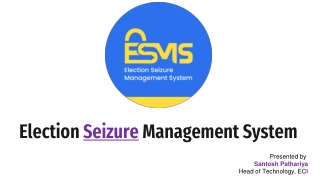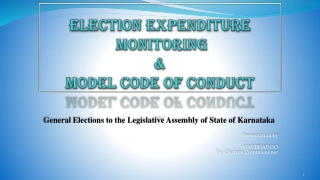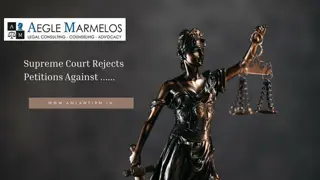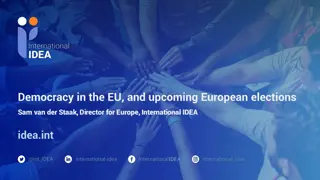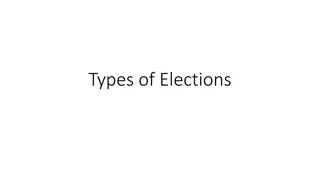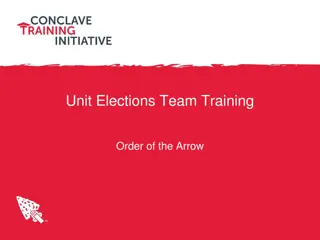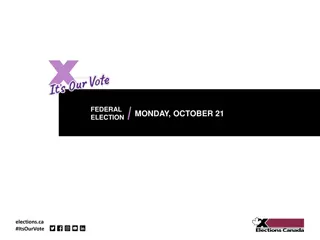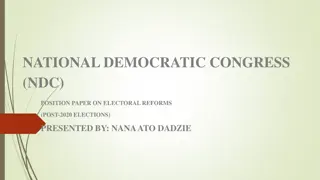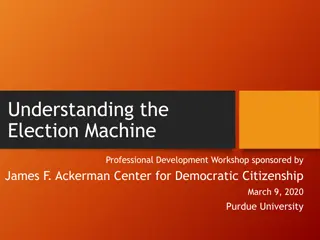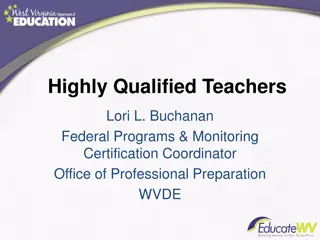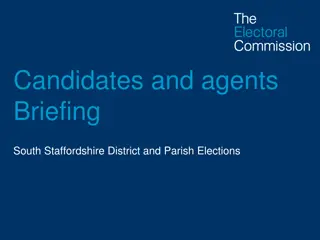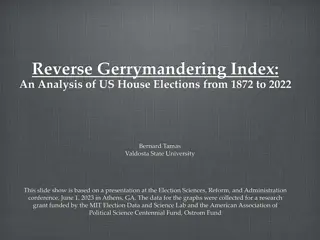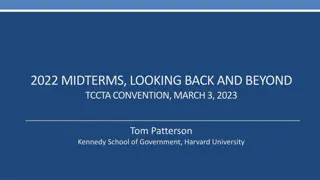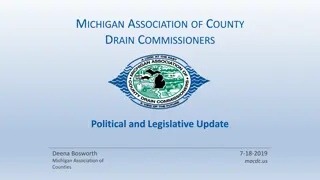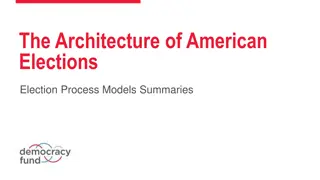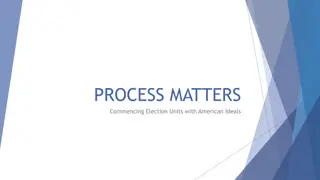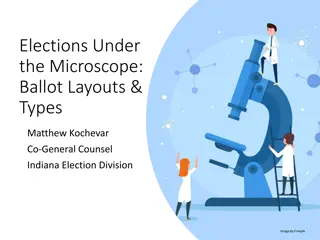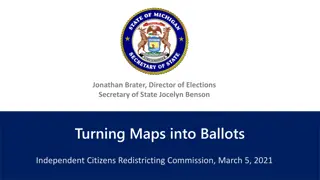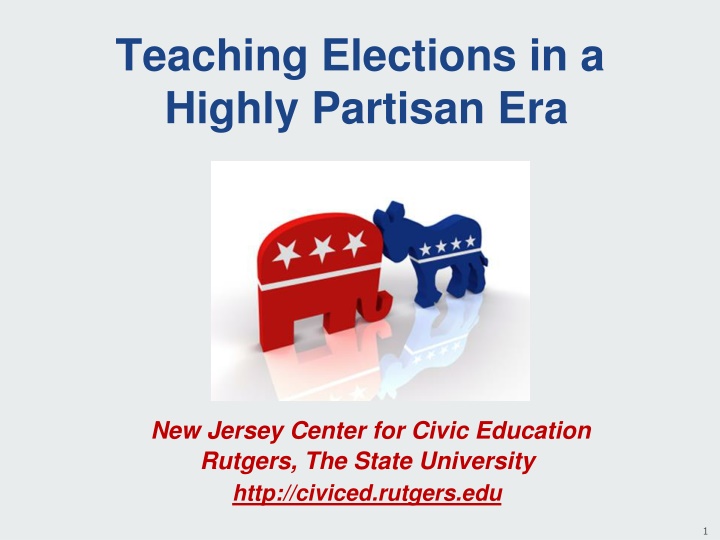
Teaching Elections in a Partisan Era - Importance of Civic Education
Explore the significance of civic education in shaping informed decision-makers. Discover research demonstrating the impact of civic learning on youth voting habits. Understand the necessity of addressing controversial issues in social studies curriculum for a healthy democracy.
Download Presentation

Please find below an Image/Link to download the presentation.
The content on the website is provided AS IS for your information and personal use only. It may not be sold, licensed, or shared on other websites without obtaining consent from the author. If you encounter any issues during the download, it is possible that the publisher has removed the file from their server.
You are allowed to download the files provided on this website for personal or commercial use, subject to the condition that they are used lawfully. All files are the property of their respective owners.
The content on the website is provided AS IS for your information and personal use only. It may not be sold, licensed, or shared on other websites without obtaining consent from the author.
E N D
Presentation Transcript
Teaching Elections in a Highly Partisan Era New Jersey Center for Civic Education Rutgers, The State University http://civiced.rutgers.edu 1
How do we help our students to become informed and reasoned decision-makers? 2
Research shows that: Young people s access to civic learning in school shapes their future voting habits and lifelong civic engagement (Kiesa et all, 2022) CIRCLE found that 81% of surveyed youth who remembered student voice experiences in high school said they were extremely likely to vote in 2024, as compared with 44% of those who did not remember student voice experiences in high school (Siegel-Stechler, Price & Medina, 2024)
Shared Folder Link for Todays Workshop https://drive.google.com/drive/fold ers/1daw_HSWAF-cQqMogIos- ENfb2ZXB_S18?usp=sharing
Elections are inherently controversial Voting on who should be our decision-makers is one of the key roles of a citizen in a democracy Elections allow the public to express its will and to hold decision-makers accountable
An effective social studies curriculum cannot avoid controversial issues! Nor should we try to avoid them
Why is it essential to teach controversial issues? You cannot have democracy without discussing controversial issues. There is an intrinsic and crucial connection between the discussion of controversial political issues and the health of democracy. Democratic self-government requires constant discussions and decisions about controversial issues. Silence about controversial issues makes it more likely that bad policies will prevail. Therefore, we need to teach our students how to do democracy by practicing the skills of discussing controversial issues in the classroom. From: Diana Hess, Controversy in the Classroom, 2009. 5
Research shows Discussing current controversial public issues: Is authentic and relevant Enhances sense of political efficacy Improves critical thinking skills Increases students comfort with conflict that exists in the world outside of classroom Develops political tolerance Motivates students Results in students gaining greater content knowledge From: Diana Hess, Controversy in the Classroom, 2009. 9
Problems Facing Teachers How to ensure civil discourse within the classroom and a positive school and classroom climate. How to protect the classroom from outside partisan pressures. How to teach about controversial issues and elections during a highly partisan era. How to emphasize that which unites us as Americans. How to ensure students are civically literate. Are there any problems that we missed and you want to add? 1 0
An Ounce of Prevention: Preparing for Controversy School policies Your community Communicating with your school administrators Classroom climate Sharing your opinions 1 1
School Policies On Teaching Controversial Issues In addition to hiring and evaluating the school superintendent, school boards work primarily through policies, which set guidelines for principals, teachers, parents and students. School policies are written, public records Your school should have a policy that: supports and encourages the teaching of controversial issues, usually policy #2240 sets guidelines for teaching controversial issues, including a process for dealing with challenges 1 2
Look at your school policy on teaching controversial issues Look at your district s policy. Advocate for one if none exists--Use these as models New Brunswick Paterson Westfield Nutley What key words or ideas do you see? Balanced, unprejudiced, no indoctrination, fair, objective 1 3
Know Your Community Do you live in the community where you teach? If not, google the town where you teach to get an idea about the demographics Look at the local newspaper or online media How might this knowledge help you? 1 4
Know What Your Objectives Are Classroom activities should encourage critical thinking. You are not trying to convince students of any particular point of view. Preview any materials, especially visual media which may be very powerful or provocative. Be able to articulate why you are using or discussing controversial materials it may be to demonstrate a prevailing view of a past time period. Be aware of biased sources of information. 1 5
Talk With Your Administrators Plan in advance: Tell your supervisor and/or principal that you plan to teach about the upcoming election or another controversial event or issue Refer your supervisor/principal to your school policy about Teaching Controversial Issues, #2240 Refer your supervisor/principal to your district s stated mission which is usually to create critical thinkers who are informed, engaged citizens Note the state social studies standards which are extremely broad and progressive and encourage teaching controversial issues and critical thinking activities Explain the value of what you are planning to teach If you anticipate controversy send a note and/or talk with parents/parents organizations 1 6
Create a Respectful Classroom Climate Establish a process and rules of adequate evidence or support so that discussion is based on facts rather than simply opinions Use activities that require students to actively listen when considering controversial issues Carefully consider how students show be grouped Provide closure, which may simply be an acknowledgement of the difficulty of the issue
Should you disclose your viewpoint? Be mindful of your position as the classroom expert and the potential impact on the students. Personal views should probably not be shared with elementary or middle school classes. There are also arguments for not sharing with high school classes. For example, students may seek to curry favor for a higher grade and not think independently. Sometimes, students may directly ask for your opinion. If you prefer NOT to disclose your view, explicitly state that and explain why. If you decide to disclose your own views, do it CAREFULLY and ONLY AFTER students have expressed their views Disclosure should be accompanied by a disclaimer o This is my view because o Other people may have different views Unrequested disclosures may be seen as preachy, or may stop the discussion contrary to the goal of having students investigate and develop their own informed opinions. Unrequested disclosures may also be viewed as efforts to indoctrinate your students.
Teach in a neutral, balanced manner that does not try to indoctrinate students First Amendment protection of academic freedom for teachers is not absolute: teachers must be teaching within the state standards and within their local school curriculum. (E.g., Kirkland v. Northside Ind. School District, 1989: a teacher has no right to substitute his own book list for the one approved by the district without permission or consent.) New Jersey has taken a very broad approach to classroom content, with standards setting a framework for each content area, but unlike many other states which establish a state curriculum, leaving significant control to local school boards. NJ teachers are protected as long as what they are teaching is within the state standards and the local curriculum and is being taught in a neutral, balanced manner that does not seek to indoctrinate students.
Start with American Ideals American ideals are a source of unity for a diverse nation and provide an important context for civic education. Focusing classroom discussions, rather than opening classroom discussions to random statements potentially disruptive of the school climate. on American ideals places valid parameters on Basing instruction on American ideals in founding documents (especially the Constitution) provides a non-partisan basis for responding to any outside advocacy or pressure groups. It avoids reliance on media sources that may elicit partisan criticism. It is crucial that instruction be non- partisan. American ideals can form the basis for inquiry-based lessons and provide a reference point for questions and discussions during the year that can be revisited. It can facilitate the infusion of civic education across the curriculum. 2 0
American Ideals: The Process First Inquiry: Identify what ideals define and unite us as Americans Define and brainstorm the concept of American ideals Review documents (e.g., U.S. Constitution) and identify ideals in them Develop a class consensus regarding 5-6 most important American ideals Second Inquiry: Application The American ideals identified can be used by your students to determine which candidate best articulates and supports these ideals, or The American ideals identified can be used with other controversial issues or historical events to determine which policies or historical figures best reflect American ideals 2 1
What Are Ideals? Define what is meant by the word, ideals . Students may confuse these with practices and policies. Ideals may be defined as those values and principles that are the ultimate goal or aim of our founding documents and institutions and which define the best of America. For example, limited government is an ideal, checks and balances is the practice to help achieve limited government. Democracy is an ideal, voting is a practice. The rule of law is an ideal, establishing a system of courts is a practice. 2 2
Links to Documents For copies of these founding documents free of partisan annotations you can go to: The Constitution: https://www.civiced.org/resource-materials/constitution-of-the-united-st ates-of-america The Amendments: https://www.civiced.org/resource-materials/amendments-to-the-constitu tion-of-the-united-states-of-america The Declaration of Independence: https://www.civiced.org/resource-materials/declaration-of-independence
Possible List of American Ideals Democracy Liberty (negative conception) Limited Government Equality Of opportunity, both political and economic Equal protection under the laws Property Rights * This is just one possible list developed by a group of teachers doing this activity. Many others are possible. Link to lesson framework: Teaching with American Ideals 2 4
What Ideals Define And Unite Us As Americans? Hopefully, Those In The Constitution On Inauguration Day, the president swears a solemn oath to uphold the Constitution: I do solemnly swear (or affirm) that I will faithfully execute the office of President of the United States, and will to the best of my ability, preserve, protect, and defend the Constitution of the United States. What ideals from the Constitution should the president uphold
What Ideals Define And Unite Us As Americans? Hopefully, Those In The Constitution On Inauguration Day, the president swears a solemn oath to uphold the Constitution: I do solemnly swear (or affirm) that I will faithfully execute the office of President of the United States, and will to the best of my ability, preserve, protect, and defend the Constitution of the United States. What ideals from the Constitution should the president uphold
The Constitution (Article VI, clause 3) requires that members of Congress swear a solemn oath to uphold the Constitution. Each candidate hopes to take this oath in January. What ideals does he/she implicitly agree to defend and uphold? Which candidate best articulates these ideals? The oath: I do solemnly swear (or affirm) that I will support and defend the Constitution of the United States against all enemies, foreign and domestic; that I will bear true faith and allegiance to the same; that I take this obligation freely, without any mental reservation or purpose of evasion; and that I will well and faithfully discharge the duties of the office on which I am about to enter: So help me God. What ideals from other founding documents should members of Congress uphold?
Classroom Strategies for Building Skills for Civil Discourse Continuum/Take a stand Active Listening/Civil Conversations Moot courts structured format for considering constitutional issues Inquiry Questions Guided discussions Socratic Seminars Philosophical Chairs discussion About Deliberations - Street Law Simulated Legislative hearings structured format for considering solutions to problems Simulated Legislative Debates 20
Take a Stand/Continuum Can use with any controversial topic e.g., immigration, reparations for racial discrimination, fracking, Electoral College, hate speech on social media, etc. Phrase a question as either/or (yes or no, agree or disagree)--e.g., Should the Electoral College be abolished? Should fracking be illegal? Should we establish a process for illegal immigrants become citizens? 21
Federalism: Should the management of elections be left to the states?
Its Been An Issue From the Founding Nothing can be more evident, than that an exclusive power of regulating elections for the National Government, in the hands of the State Legislatures, would leave the existence of the Union entirely at their mercy. * * Publius: The Federalist 59, New York Packet, 22 February 1788, Center for the Study of the American Constitution, University of Wisconsin Madison, https://csac.history.wisc.edu/wp- content/uploads/sites/281/2017/07/59.pdf. The Anti-Federalists were in favor of state control of elections.
Take a Stand/Continuum Ask the students to stand to one side of you if they agree and to the other if they disagree. You can ask those who are unsure to stand in the middle. The stronger the opinion, the farther the students move from the center. Now the students have taken a stand and formed a continuum of views. Turn and face the line. Ask those at either ends of the line to explain WHY they take their position There are no rebuttals, students explain their views (why) and listen to others If you hear a viewpoint that does not fit with where the student stands, have the student move to an appropriate spot. Ask those in the middle who were unsure if what they heard helped them decide and ask them to move to the appropriate spot Ask others if they changed their views based on what they heard and ask them to move to the appropriate spot.
The Constitution is clear that voting and elections are primarily a state concern: Art. I, Sec. 4: The Times, Places, and Manner of holding Elections for Senators and Representatives shall be prescribed in each State by the Legislature thereof; but Congress may at any time by Law make or alter such Regulations .
The Issue: Voting and Elections The Pew Research Center found that Americans remain divided on whether voting is a right or a regulated privilege. Since the debunked claims of a stolen election in 2020, there has been an upsurge in bills before state legislatures regulating voting and allowing increased partisan control over the tabulation and certification of votes. Some states seek to more tightly regulate voting procedures and voter registration, while others have pending legislation to expand voter registration and access to the ballot. For more complete details and statistics, see the Brennan Center for Justice, Voting Laws Roundup, May 2024
Should the management of elections be left to the states? The federal government, in the interest of fairness and equal access to voting rights, has exercised some control over voting through the 14th, 15th, 19th, 24th, and 26th Amendments and the Voting Rights Act of 1965. However, recent Supreme Court decisions have effectively gutted the Voting Rights Act in Shelby County v. Holder (570 U.S. 529, 2013) by eliminating the need for states that have discriminated in the past to obtain preclearance from the federal government before making changes in their voting procedures, such as places and times of voting, which might adversely affect minority groups.
Research: Does this change your opinion? CON (No) PRO (Yes) Voting is a privilege that states have a legitimate interest in regulating. States have an interest in regulating their own state elections and adapting to local views and conditions. If one party intent on rigging elections gained control of the branches of federal government, it could end our democracy. With state control, some states would likely remain in control of the opposition party and a check on the federal government. Voting is a right that should not depend on state of residence. Some states are engaging in tactics that result in voter suppression, such as limiting the places or times for voting, or placing the counting of votes in the hands of partisans, or diluting the impact of certain votes by gerrymandering. Our democracy depends on every citizen having the same access to voting and having their vote count equally.
Should the management of elections be left to the states? Those who agree, stand to the right. Those who disagree, stand to the left. Those who are unsure, stand in the middle. Ask those at either ends of the line to explain WHY they take their position There are no rebuttals, students explain their views (why) and listen to others If you hear a viewpoint that does not fit with where the student stands, have the student move to an appropriate spot. Ask those in the middle who were unsure if what they heard helped them decide and ask them to move to the appropriate spot Ask others if they changed their views based on what they heard and ask them to move to the appropriate spot. 23
Take a Stand/Continuum The value of doing the continuum is that students are listening, reflecting on what they hear, explaining their views, and perhaps changing their views based on what they hear from others. They are NOT DEBATING. Afterwards, you might have the class do research and see if some additional information causes some students to change their initial opinions. 24
The Electoral College Article II, Section 1 of the U.S. Constitution establishes how the president is elected: Each state shall appoint, in such Manner as the Legislature thereof may direct, a Number of Electors, equal to the whole Number of Senators and Representatives to which the State may be entitled in the Congress .
How does the Electoral College Work? When voters go to the polls in a Presidential election, they actually are voting for the slate of electors vowing to cast their ballots for that ticket in the Electoral College. Each elector casts one electoral vote following the general election; there are a total of 538 electoral votes. The candidate that gets more than half (270) wins the election.
Why did the founders decide that the president should be elected through an Electoral College ? Distrustful of executive power and wanted to make sure that the president would not become a despot Considered several methods of electing the President, including selection by Congress, by the governors of the states, by the state legislatures, by a special group of members of Congress chosen by lot and by direct popular election. At the time of the convention in 1787, no country in the world directly elected its chief executive. Feared the public would not be well informed enough to be able to select the best candidate Afraid a democratic mob might steer the country astray and a populist president, appealing directly to the people, could command dangerous amounts of power Did not trust voters to make a wise choice
Problems with the Electoral College All states (except Maine and Nebraska) allocate their electoral votes to the candidate who received the plurality of vote This has delivered the presidency to a candidate who did not win the popular vote: 1824, 1876, 1888, 2000 and 2016 In 1787 states populations varied but not as much as they do today Each person s vote does not carry equal weight Those living in low-population states get a disproportionately bigger say in presidential election. E.g., Wyoming has 3 electoral votes and 586,107 people while California has 55 electoral votes and 39,144,818 resident so individual vtes from Wyoming carry 3.6 times more weight than those from California. Harvard law Prof. Lawrence Lessig has questioned whether the Electoral College violates the idea of one man, one vote
Should we abolish the electoral college and have a direct popular election for president? Conduct research Debate Active Listening Socratic Seminar read a text and discuss Socratic Seminar Teaching Strategy | Facing History & Ourselves Structured Discussion About Deliberations - Street Law Simulated Legislative hearing students roleplay governors from selected states and/or constitutional experts and testify before Congress about the Electoral College Simulated Legislative Debate students roleplay members of congress from selected states debate the question
CIVIL DISCOURSE REQUIRES ACTIVE LISTENING The biggest communication issue is we do not listen to understand. We listen to reply. 18
What is Active Listening? Eye contact, Nodding, Shaking head? Saying yes or no? Seeking information: asking a question? Seeking confirmation: rephrasing or paraphrasing?
Directions: Active Listening/Civil Conversations Select a controversial issue that you can narrow to two sides. For example, gun control, health care, reparations, guaranteed minimum income, carbon taxes, NATO, border security. Place 8-10 chairs in front of the classroom, 2 rows facing each other Form teams of two, three or four people First person states viewpoint and briefly explains why No one interrupts Opposite side takes turn making argument Before person across from him or her can respond, must in some way restate his or her understanding of what has been said
Should we abolish the electoral college and have a direct popular election for president? The row to the right argues yes ; to the left argues no. The first person arguing yes states his or her position and briefly explains why. The first person arguing no must in some way restate his or her understanding of what has been said, then states their position and briefly explains why The argument then goes to the second yes , who must restate the position just stated, then states their position and why. The patterns continues, back and forth, restating and stating, until all have spoken. No debate or interruption is permitted. 26
Debrief: Active Listening/Civil Conversations What do you see as the value in this activity? Can you envision implementing this activity in your classroom? If so, would you change (add or subtract) any element? Would you do research on the topic as background or as a follow-up activity? Why?
What are the best arguments for maintaining the Electoral College? The Electoral College is enshrined in the Constitution The Founders thought that it was the best method for electing the president Prevents larger states from having undue influence Avoids the possibility of a run-off if the candidate to receive the highest popular votes does not obtain a majority: e.g., Pres. Nixon in 1968 and Pres. Clinton in 1992 won the most electoral votes but only 43% of the popular vote due to third party candidates Creates a larger mandate to give a president more credibility: e.g., Pres. Obama received 51.3% of the popular vote in 2012 but 61.7% of the electoral vote In 230 years the winner of the popular vote has lost the electoral vote only five times.

